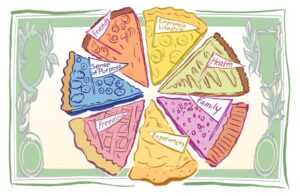
Illustration by Cathryn Cunningham / Albuquerque Journal
What is wealth?
Many people think wealth is simply money. This definition would include your investment accounts and your bank accounts. You work hard to save and invest wisely, striving to increase your net worth so you can retire with a healthy nest egg. This is important.
But wealth is much more than money.
A related question to “What is wealth?” is “How can I use my money to become happier?”
This leads us to the relationship between money and happiness.
If you agree that wealth is far more than money, let’s consider other factors that impact our wealth and our happiness.
Good Health
A common saying is “Health is Wealth,” because maintaining good health is more important than ever as we get older. I used to tell my financial planning clients (before I retired from serving clients in late 2021) that they should focus on their health after they retire.
Getting adequate exercise and eating healthy is extremely important. I recommended that clients spend money to hire a personal trainer, join a health club or a hiking club, or take tennis lessons. If you hate going to a health club, buy some home exercise equipment, and research the many exercise videos available (at no charge) on YouTube. Ask a neighbor if they would like to walk with you on Saturday mornings.
Strong Relationships
Another important component of wealth is having good relationships with friends and family. The results of an 85-year study, known as the Harvard Study of Adult Development, were summarized in a 2023 book titled The Good Life. The study began in 1938 during the Great Depression, and followed participants from their teens through the end of their lives. It now includes three generations and over 1,300 descendants of the original 724 participants. Originally intended to study human health and what makes people thrive, the study has morphed into a major study of happiness.
The directors of the study summarized the enormous volume of information gathered down to this simple statement: “Good relationships keep us happier, healthier, and help us live longer.”
Having strong relationships with friends and family is extremely important as we get older. Spending more time with family members is worth the extra effort. Take your grandkids on a special trip, or plan a family reunion and (if you are able) pay for everyone’s travel expenses. This is a great way to spend money to increase your happiness. Get together more often with friends. Invite your neighbor to lunch. Travel to see the friend you haven’t seen in years.
Experiences
Research shows that experiences provide us with more happiness than buying more “things.” Too many material possessions often lead to cluttered homes and more stress. The pressure we feel to buy, buy, buy also leads to credit card debt, car loans, and a lack of financial security.
Conversely, we remember experiences for many years, such as vacations, holidays, and summer gatherings on the back patio with friends. Neuroscience research also shows that the anticipation of an experience can make us happier because of the release of endorphins from our brains. Therefore, planning experiences ahead of time — and paying for them early — can make us happier. Of course, with the pandemic forcing us to cancel many travel plans over the past three years, we need to make sure that deposits are refundable.
Enjoyable Lifestyle, Freedom, and Time
In his book The Psychology of Money, author Morgan Housel states, “The highest form of wealth is the ability to wake up every morning and say, ‘I can do whatever I want today.’” Having money gives you the freedom to retire when you choose, take a vacation, help your kids out financially, and spend your time doing whatever you want. In essence, money gives us freedom over our time and lifestyle. These are valuable benefits.
Sense of Purpose
Researchers have found that having a sense of purpose is an important element of happiness. Having a job that we find fulfilling can give us a sense of purpose. Helping others who are less fortunate — through volunteer work or donating to charities — can be personally rewarding. Being a lifetime learner and studying history, climate change, or geology can be satisfying. Hobbies such as gardening, playing an instrument, being an avid reader, knitting, or training for an upcoming race can all provide a sense of purpose.
Exploring our creativity, embarking on simplifying our homes, or making deliberate changes to strengthen our relationships are all worthwhile efforts.
Money and Wealth
Money is important, and having enough money to support our chosen lifestyle is important. Knowing we will not run out of money before we die is a goal for most retirees.
Yet many other variables are involved in our wealth.
A recent study by Matthew Killingsworth and Daniel Kahneman concluded that a higher income (as high as $500,000 per year) can make us happier. This contradicts a 2010 study (by Kahneman and Deaton) that suggested annual incomes over $75,000 do not make us happier. However, the researchers in the recent study found that about 20% of the 33,000 participants were financially well-off … but unhappy. The fact that 20% were unhappy reinforces the stance that having money does not guarantee happiness. The authors concluded that money is just one of many determinants of happiness. If you want to boost your happiness, focus on the other slices in the pie.
Thanks for reading! To receive my monthly email with my latest article – and excerpts from my upcoming book Sage Choices After 50 – please sign up here. Connect with me on Medium and read past articles here.

Donna Skeels Cygan, CFP®, MBA, is the author of The Joy of Financial Security. She owned a fee-only financial planning firm for over 20 years and is now writing a new book, Sage Choices After 50, that will be published in 2023.